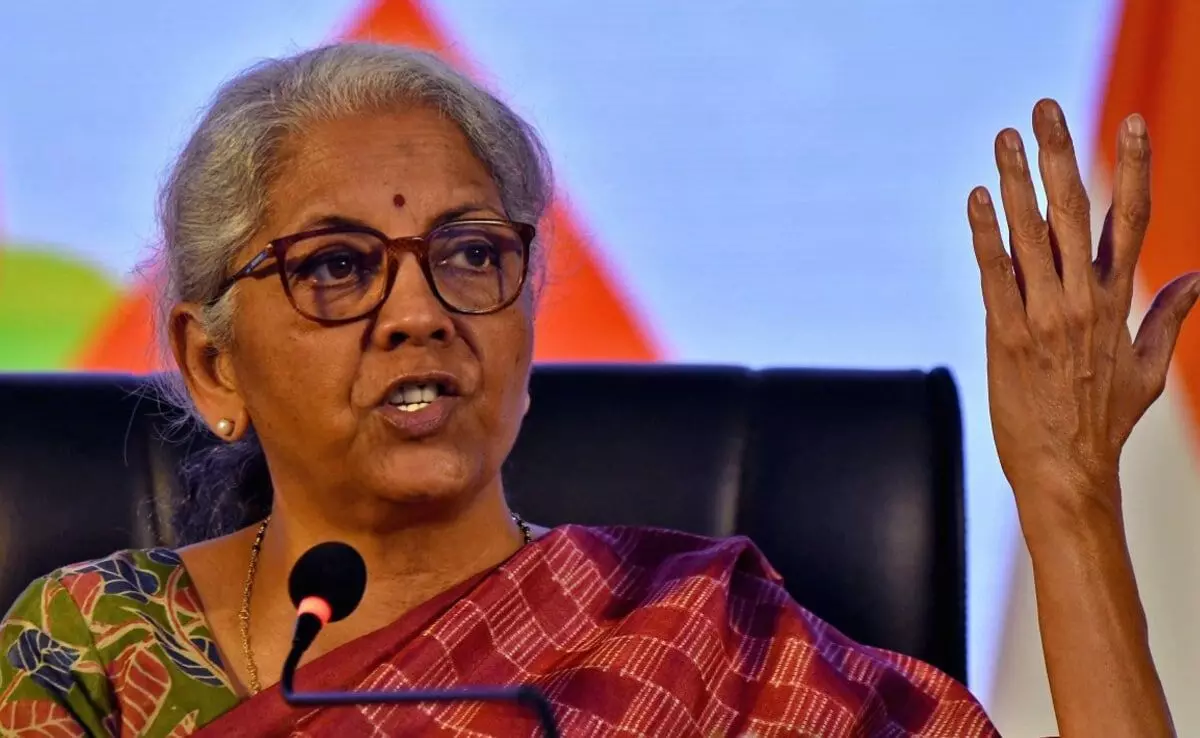Make globalization more transparent: FM Sitharaman in US
Goods which are largely consumed in India are going to be manufactured in India despite a very, very predatory pricing, which prevails in some export countries in some export markets
By Newsmeter Network
New Delhi: India is not seeking to reverse the benefits of globalization, but is asking that it be made more transparent, Union Finance Minister Nirmala Sitharaman said Monday.
"It's not to say that we have to reverse the benefits of globalization. It is more to say, make globalization more transparent," Sitharaman told a prominent American think-tank Peterson Institute for International Economics in response to a question.
For a very long time, it has been India's attempts to make sure its manufacturing sector grows. "We have a big play. We also don't import final consumer goods, which we are capable of manufacturing. However, when you have price discrepancies or price competitiveness affecting your purchasing decisions, you end up buying those which you can produce because they come at a far more, cheaper rate," she said.
"So, Indians have always had this difficulty in having to come back to producing certain things which are your day-to-day domestic necessities, but you are unable to produce because you find cheaper imports coming or the very same requirement. But now we've seen that there is an opportunity which lies, one from the consumer point of view, that even within India, there's enough purchasing power. And many of these goods which can be produced in India will have a definitive large consumer base within the country," she said.
So, catering to the domestic market itself has become now attractive for many of those producers who wouldn't have produced such things which were otherwise available for cheap from outside, she noted.
"The phase manufacturing programmes that we have come up with, have identified several such goods, which at the first stage, we would gradually incentivize producing and selling within India, then move over to a higher level of sophistication in the making of such goods. So, the domestic market itself is available for you to produce, gradually stop imports of such things which you can produce yourselves," she said. Sitharaman said this is one side of the story.
"The other side is where you need to have value chains come to India, come and produce in India, not just for India, but to export from India, for which again, we have come up with a production-linked incentive scheme, particularly in 13 such areas, which are priority sectors, sunrise sectors, where India didn't produce at all earlier". By doing that, India hopes to have production of many of these large bulk manufactured goods, which can go from India to meet demands which exist outside, and also of course to meet domestic demand. Mobile manufacturing is a classic example, she noted.
Goods which are largely consumed in India are going to be manufactured in India despite a very, very predatory pricing, which prevails in some export countries in some export markets. "So we are stopping that by giving the face manufacturing and we are incentivizing through the PLA," she said.
The finance minister said even as one wants to incentivize India's own production, there can always be some collateral, but it has to be very smartly tailored to make sure that India's unique demands can be met by its own manufacturing. "But at the same time, you need to get your raw materials and intermediaries which otherwise you do not have. So, it's not as if you're going to be so blindfolded to see that you'll just take a decision and it'll have no impact whatsoever outside," she said.
"It can't be so. It'll have an impact. We have to assess each for itself and take a call. But however, I don't think India's alone in doing this, particularly after, let's say the global view of China after, let's say the pandemic after also this changing perspective of what indeed is globalization, how far globalization, to what extent globalization. So, when all these questions are happening and being discussed all over the world, India cannot be in isolation,” the minister said.
"So, if that's going to, the discussions elsewhere are going to have some impact. So, we will have in India as well. It indicates to a dynamic position globally on globalization itself, and also looking at how just tariff is not going to be one way of controlling or preserving your capacities in manufacturing. So it is a strand, I suppose, in a larger debate of how the global trade will have to happen,” she said.
Responding to a question, she said, India has shown very clearly, its initiative is working out well in pursuing with countries and agreeing to have Free Trade Agreements (FTA) with them.
Free trade agreements are being signed, in fact far speedy nowadays, she said in response to a question. “We have just concluded one with Australia. We've concluded earlier, one with the UAE, Mauritius, and as it is, we've, had agreements with ASEAN, both in goods and services. We have with S Korea, with Japan. So free trade agreements have bilaterally or with multilateral groups, been the route which India has had till before 2014," she said.
"And now between 2019 and today, we've had at least three major agreements signed. So, we shall proceed in that route. Also with the United Kingdom, with the European Union and with Canada. All the three are happening now as we speak, the negotiations are going on. So, we shall go in those preferential route," she said, but remained uncommitted on plurilateral agreements.
Inputs from PTI